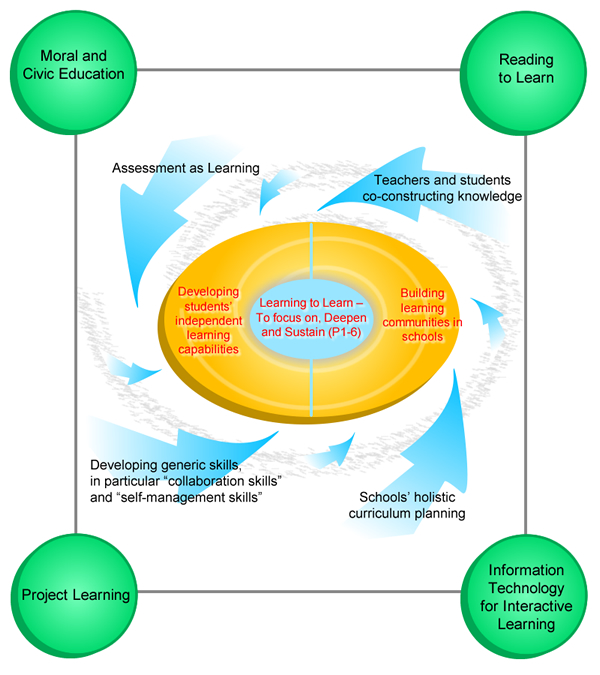 |
| |
| |
| Four Key Tasks – Achieving Learning to Learn |
| |
| 3 Overview |
| |
| |
| Review on Progress of the Four Key Tasks |
| |
| Background |
| |
| In 2001, the Curriculum Development Council suggested in its report Learning to Learn - The Way Forward in Curriculum Development that the Four Key Tasks, including Moral and Civic Education, Reading to Learn, Project Learning, and Information Technology for Interactive Learning, be implemented in various Key Learning Areas (KLAs) and across KLAs, so as to help students develop independent learning capabilities. |
| |
| |
| Achievements and Strengths |
| |
| Since the launch of the Four Key Tasks, schools have been able to incorporate them into their curriculum, treating each of them as an independent learning and teaching strategy, or connecting them and integrating cross-curricular learning into various KLAs/subjects to develop students’ generic skills and independent learning capabilities. Schools have achieved the following in the implementation of the Four Key Tasks: |
 |
Moral and Civic Education (MCE) - Schools mainly implement MCE by infusing relevant elements into class teaching, and making use of different learning time-slots and the school-based curriculum. Schools also broaden students’ learning experiences and foster their whole-person development through life-wide learning. |
 |
Reading to Learn - A whole-school approach is commonly adopted, often encompassing the organisation of diversified reading activities and award schemes, as well as enhancing the teaching of reading strategies. Most schools are able to deploy their teacher-librarians well to promote reading and enlist parents’ support. Thus, a good reading culture has been nurtured in schools. Students’ reading performance has also remarkably improved. |
 |
Project Learning - The majority of schools implement Project Learning by adopting subject-specific or cross-subject themes, or through the subject of General Studies, with the integration of reading and information technology. These aim to enrich students’ learning experiences as well as to develop their multi-perspective thinking and generic skills. |
 |
Information Technology for Interactive Learning - Schools generally have adequate IT hardware, network access in classrooms, as well as intranet, on-line learning platforms and discussion platforms. Teaching approaches are increasingly diversified, which contributes considerably to promoting teacher-student and student-student interactions as well as students’ self-learning. |
| This reflects that schools have actively taken forward the curriculum reform and accumulated considerable successful experiences in the process of implementing the Four Key Tasks. Nowadays, schools place much emphasis on providing students with appropriate learning experiences, helping them develop generic skills, in particular communication skills, critical thinking skills and creativity. Positive results have been achieved in strengthening teachers’ mastery of learning and teaching strategies, enhancing students’ learning interest and skills as well as inculcating proper attitudes in them. There has been a paradigm shift in learning and teaching. Schools are recommended to build on past experience, consider the stage of curriculum reform and make good use of assessment to strengthen the holistic planning of the curriculum. Schools can focus and deepen the development of the Four Key Tasks through setting “learning to learn” as the target to sustain the development of students’ independent learning capabilities. |
|
| |
| |
| The Way Forward |
| |
 |
Moral and Civic Education: Teachers can streamline their implementation strategies and continue to provide students with an open, authentic and reflective learning experience to help them develop independent and critical thinking skills, collaboration skills, and positive values and attitudes. |
 |
Reading to Learn: Schools should build on their existing strengths and continue to set “Reading to Learn” as a sustainable key task to further enhance students’ reading interests, engagement and depth of processing. Reading across the curriculum should also be promoted to help students make connection with their prior knowledge, life and learning experiences, and develop self-learning habit and capabilities. In addition, schools should also teach their students to make good use of the electronic media for reading to strengthen learning effectiveness. |
 |
Project Learning: Schools can streamline the planning of project learning by strengthening the vertical development of project learning skills and also its connection with various subjects and other Key Tasks. Schools can also put more emphasis on the exploratory aspect of project learning, provide more opportunities for students to learn how to look at things from different perspectives and further enhance their critical thinking skills, creativity, higher-order thinking skills, collaboration skills and self-management skills. |
 |
Information Technology for Interactive Learning: To keep pace with the schools’ development progress, a clear policy can be formulated to integrate information technology into the learning and teaching activities of various subjects, and make use of online learning platforms to promote effective interactive learning. This allows teachers and students to co-construct knowledge, thus promoting self-directed learning. |
| |
Fig 3.1 The Way Forward |
|
| |
| Developing students into life-long learners is an important direction of curriculum reform, and the reform in itself is a long process of continuous development. In order to keep pace with the times, schools should further develop a student-centred curriculum based on existing strengths, so as to enhance students' learning to learn capabilities to facilitate life-long learning. Apart from continuing to enhance teachers’ professional knowledge, schools should also evaluate the effectiveness of their work by using data and evidence. To enable schools to develop into learning communities, teachers should constantly explore new knowledge, build up a network for professional exchange, learn from the success of other schools and become students’ partners in the pursuit of knowledge, thus achieving the goal of “learning to learn”. |
|
| |
| |
| References |
| The following references are by no means exhaustive and listed for reference only. |
| Publications |
| 課程發展處(2011)。小學課程改革研究2011評估報告。香港:課程發展處。 |
| |
| 課程發展處(2011)。2011/12 新任小學課程統籌主任培訓課程簡報。香港:課程發展處。 |
| |
課程發展議會(2001)。學會學習-課程發展路向。香港:課程發展議會。 取自
|
| |
| Website |
Education Bureau - Inspection Annual Reports
http://www.edb.gov.hk/index.aspx?nodeID=744&langno=2 |
| |


